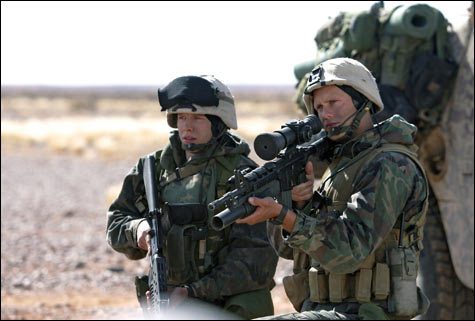
ON SITE: Generation Kill transforms Iraq from a theoretical problem into something you feel in your gut. |
The Iraq War poses a strange problem for the American public. On the one hand, whether and how to exit Iraq — and what lessons to draw from the invasion and its aftermath — are crucial political, cultural, and moral questions. On the other, a broad swath of the citizenry has zero personal stake in what’s happening there. Most of us have never come close to fighting in Iraq; neither have our family members or our friends. We know that Iraq is a critical issue. But we also feel that it’s somebody else’s issue.Generation Kill (HBO, premiering July 13 at 9 pm and running for seven consecutive Sundays) doesn’t change this reality. But the new Iraq War mini-series from writers/producers David Simon and Ed Burns, the team behind The Wire, does destabilize it, by providing a vivid, troubling portrait of what the soldiers unlucky enough to serve in Iraq experienced at the war’s beginning. If, like me, you’re fortunate enough to have been insulated from the human costs of the invasion and occupation, you’ll find that watching Generation Kill transforms Iraq from a theoretical problem to something you feel in your gut.
At the outset, the Marines of the First Reconnaissance Battalion aren’t an overly sympathetic bunch. Waiting for the invasion to start, they trade homophobic barbs, jerk off to Hustler, and rhapsodize about how awesome it would have been to drop the bomb on Hiroshima. Early in the first episode, a batch of earnest letters from American schoolkids arrives, and there’s a hopeful one that floats the possibility of peace. Corporal Ray Person (James Ransone), the mouthiest of the Marines, orates an immediate and eloquently obscene response: “Dear Frederick: Thank you for your nice letter. But I am actually a U.S. Marine who was born to kill, whereas clearly you have mistaken me for some sort of wine-sipping, commie dick-suck. . . . Peace sucks a hairy asshole, Freddy. War is the motherfucking answer.”
Given this unendearing set-up — and the rapid, disorienting introduction of characters, hierarchies, and military terminology — some viewers are bound to give up on Generation Kill during or after the pilot. They’ll be making a mistake. Once the invasion commences, our perspective on the men of First Recon undergoes a radical shift. Their equipment sucks. Their superiors are glory whores at best and dangerously incompetent at worst. The criteria for who they’re supposed to kill and who they’re supposed to help keep shifting. And despite all that early kick-ass swagger, the violence quickly takes a psychological toll. In one powerful scene, the battalion’s mid-level leaders pressure their top-ranking officer to evacuate an Iraqi boy who’s been shot up by Lance Corporal James Trombley (Billy Lush), the resident sociopath, and is barely clinging to life. They succeed, to a point — and are rewarded with a tongue lashing on the perils of insubordination.